

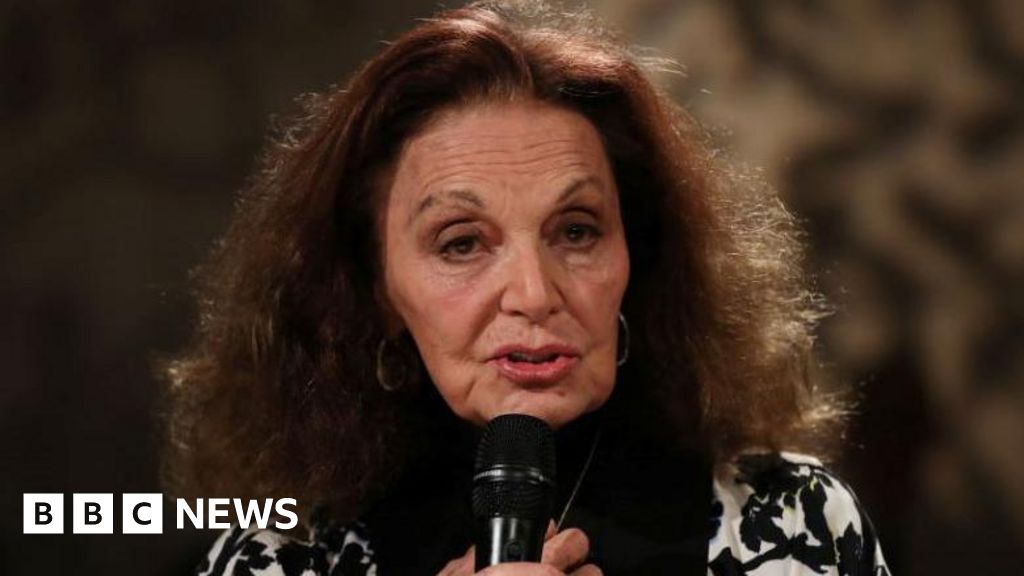
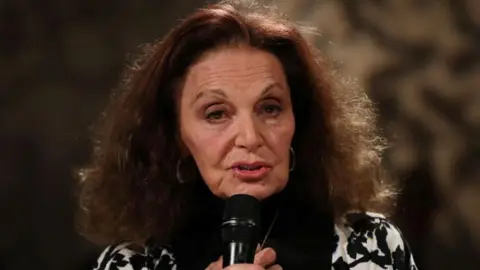 Getty Images
Getty ImagesWhat do you wear to an interview with Diane Von Furstenberg, the acclaimed fashion designer who invented a dress so renowned it’s still being talked about fifty years later?
Von Furstenberg, 77, launched her famous wrap dress in America in 1974 and told me, by “some magic thing, it took off”.
That magic appears to be a combination of fashion flair, drive and timing.
It was an era of liberation, as women pushed to be taken seriously in the workplace.
The dress was flattering but office-appropriate.
The stretchy jersey fabric and wrap design “moulds your body and makes you look ‘proper’ but at the same time sexy,” Von Furstenberg said.
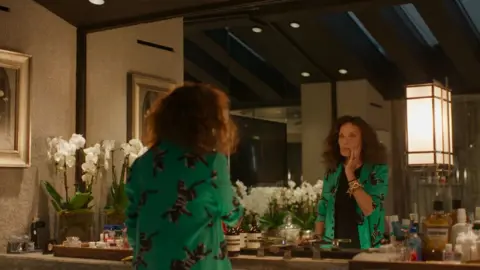 Disney
DisneyShe had already created a wrap top modelled on a dancer’s cardigan, with a matching skirt and trousers.
But during Watergate, she was excited to see President Nixon’s daughter, Julia Nixon Eisenhower, on TV defending her father over the political scandal.
“She was wearing my wrap top with a skirt. I thought, ‘oh look’, I was so proud.
And then I thought, ‘you know what, we should turn it into a dress’.
In the years since, Madonna, Jerry Hall, the Princess of Wales and generations of regular working women have worn versions of the dress.
Oprah Winfrey remembers saving up for it as a young reporter.
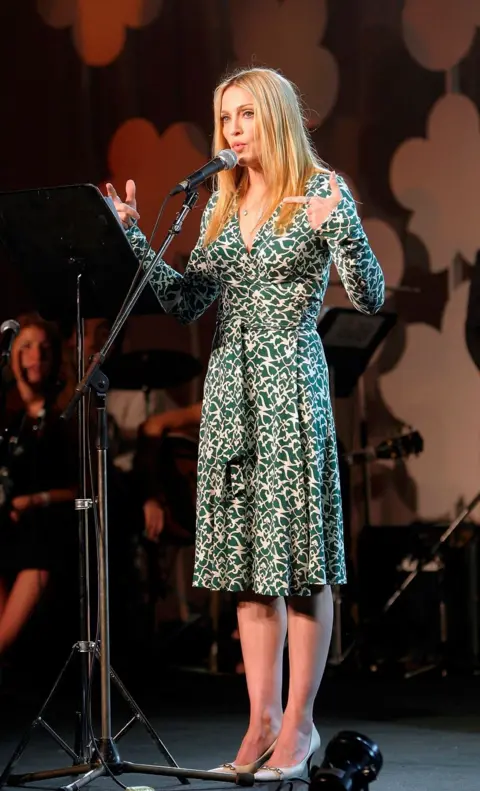 Getty Images
Getty ImagesThe designer is now the focus of upcoming Disney Plus/Hulu documentary, called Diane Von Furstenberg: Woman In Charge, revealing what drives her.
She tells me she didn’t know what she wanted to do for a career, “but I knew the kind of woman I wanted to be. I wanted to be a woman in charge”.
For her, it was about being free to live as she wished.
This was at a time, initially, when American women couldn’t even have a cheque book or credit card without a man co-signing.
Former US secretary of state Hilary Clinton calls von Furstenberg “one of the very first women who had really broken through the glass ceiling in business”.
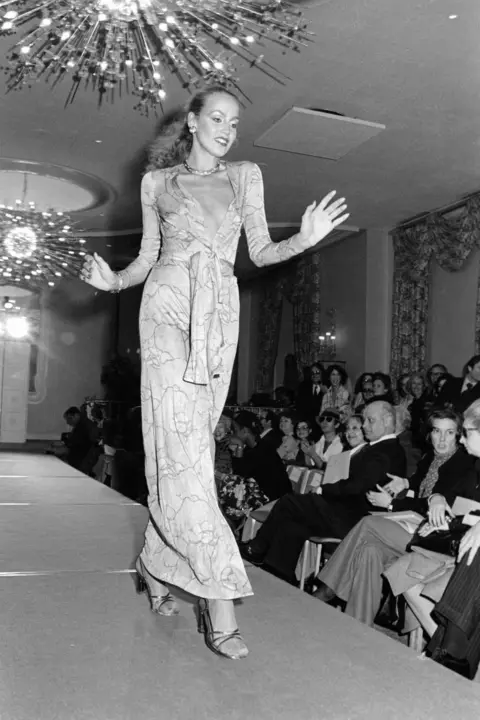 Getty Images
Getty ImagesThe designer became a regular on chat shows, feted as a Jewish immigrant princess (her first marriage was to a German prince) who had, as the famed US anchor David Letterman put it, “reinvented the dress”.
The irony of her first husband being German was never lost on von Furstenberg.
Her mother, Lily Halfin, survived the Auschwitz and Ravensbruck concentration camps during World War Two.
She was freed weighing just 20kg, and doctors told her fiancé it would be too dangerous for her to have a child.
But 18 months later, Diane was born.
“My mother used to say, ‘God saved me so that I can give you life. By giving you life, you gave me my life back. You are my torch of freedom’.”
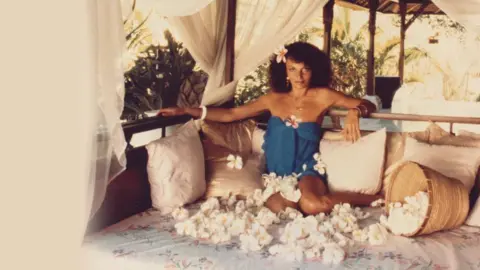 Disney
DisneyBut her mother’s parenting style was tough.
Even as a tiny child, Diane was told she was not allowed to be afraid of anything or ever to be a victim.
It was as if Lily was preparing her daughter, in case Diane had to go through the horrors she had endured.
“If I was afraid of the dark, she locked me in the dark closet. Today she could be arrested for that.
“But as a result, she taught me fear is not an option. Push the fear away and deal with whatever you have to deal with. And that is the most extraordinary lesson”.
The designer does appear fearless. She has lived life to the full, enjoying a string of celebrity friends and lovers.
In the documentary she says she was offered a threesome with Mick Jagger and David Bowie. She turned them down, deciding saying no would be a better story.
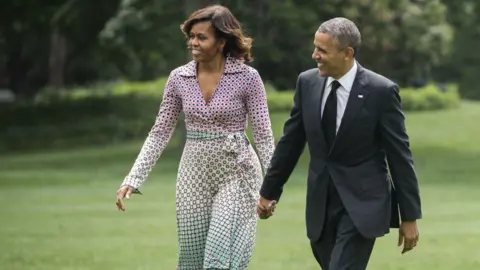 Getty Images
Getty ImagesShe’s also faced bankruptcy more than once. After losing everything and starting again, she later took to the newly launched QVC shopping channel in the US, to sell her dresses.
The high end fashion world may have sneered. But on that very first appearance in 1993, the dresses sold out in just two hours, with $1.3m worth of orders. It was a way back into business.
Von Furstenberg’s life, as the documentary’s director Sharmeen Obaid-Chinoy told me, is “an anthem of freedom”.
The Pakistan-born director of the next – and still secret – Star Wars movie has already won two Oscars for her documentaries about women’s struggles in Pakistan.
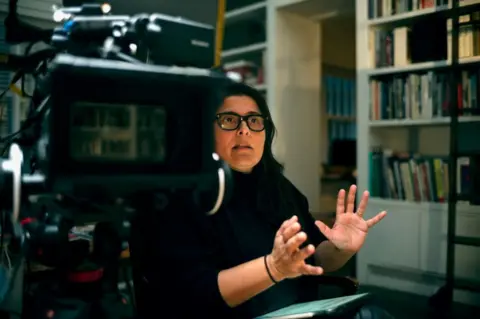 Disney
DisneyObaid-Chinoy says she’s “made films my entire life about women faced with extraordinary circumstances, who have, in the face of adversity, risen up and really been trailblazers”.
She calls the designer “a woman who really created something out of absolutely nothing and did it at a time when women were not even part of the conversation.”
The director, who’s moved into the superhero universe and has directed Ms Marvel for TV, also gave us a tiny hint about directing the new Star Wars film.
It’s centred on another female hero.
The movie’s focus is “very much Daisy Ridley” (who had her breakthrough role as Rey in Star Wars – Episode VII: The Force Awakens back in 2015).
But the film will also include “so many of the characters that we’re bringing back into the Star Wars universe, and the characters we’re breathing new life into”.
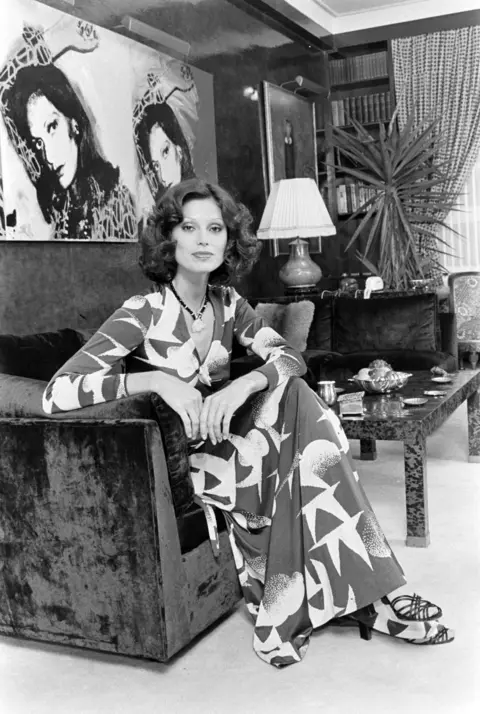 Getty Images
Getty ImagesDespite scaling her business back since the pandemic, von Furstenberg is delighted her designs are still enduring for new generations.
The wrap dress, she says, is now being rediscovered by younger women.
“It’s never actually happened that a dress has survived 50 years and that’s even more of a revolution than the first time.”
In an age-obsessed industry, the designer appears completely unfussy about getting older.
In the opening scene of the documentary, we see her climb into her bathroom sink, make-up free, to do her face in the mirror as she discusses how wrinkles chart “the map of your life”.
In person, she laughs as she tells me she looks terrible in those shots.
But she doesn’t seem to care anyway, vehement that age is something we must embrace with pride.
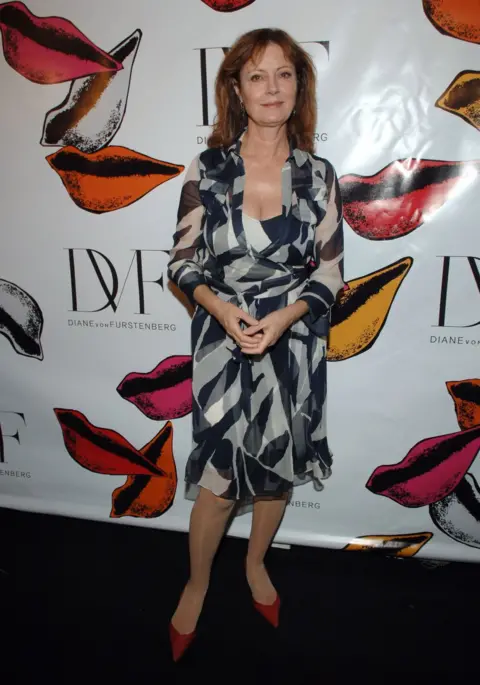 Getty Images
Getty ImagesShe tells me her attitude may have something to do with her mother’s story.
“My birth was a triumph of life, it was a gift. So every day I have to honour life”.
It’s a mantra she leaves me with as she departs the interview, clothed, of course, in one of her own dresses. It’s white with a black pattern, although not a signature wrap dress.
For what it’s worth, I had opted for a brightly coloured summer dress I bought on a Greek beach years ago. We didn’t discuss our outfit choices. That was probably for the best.